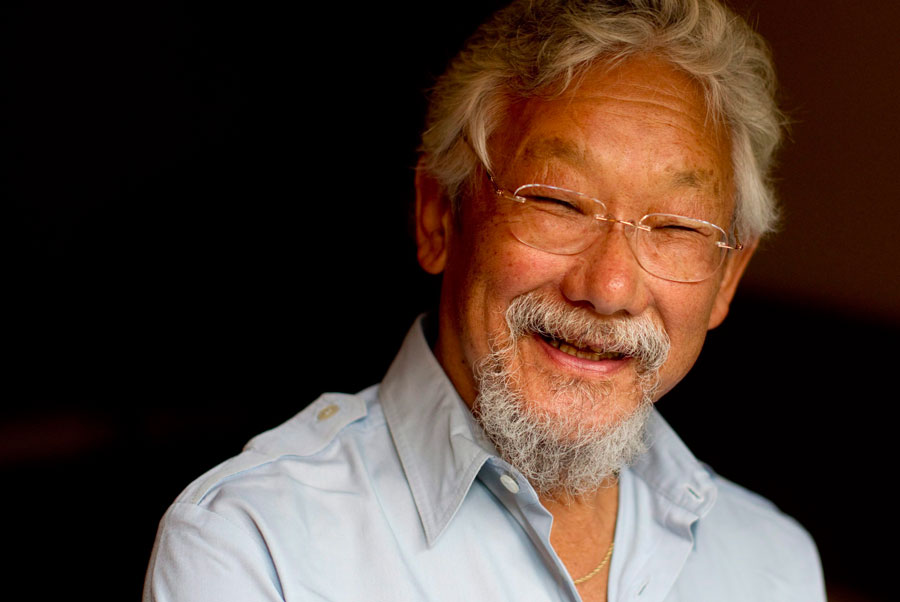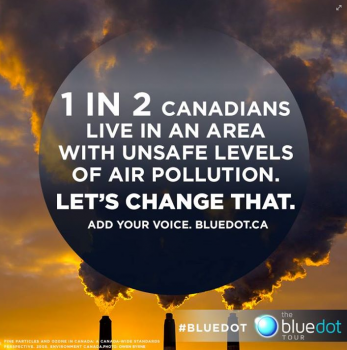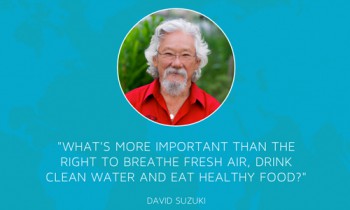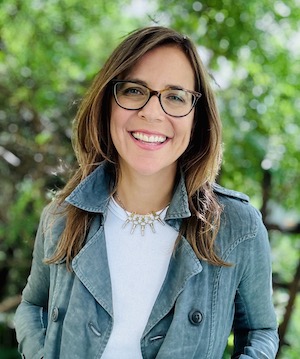The Big Interview: David Suzuki on His “Final” Push – Unedited
November 18, 2014

I’ll admit I was pretty giddy about interviewing the godfather of Canadian environmentalism. I’d met David Suzuki briefly in passing once and the man officially endorsed my first book, Ecoholic, but we’d never sat down and just talked. When I finally got the chance to do so while he was in Toronto for his final cross-Canada tour, the Blue Dot Tour, I was less interesting in questioning him, journalist to subject, and deeply keen on communicating environmentalist to environmentalist. Or as he suggested “human to human.” And what an honour it was talking to this particularly legendary human being. Here’s some of the unedited version of our 40+ minute interview originally published in condensed form in NOW Magazine.
You’ve been called the godfather of Canadian environmentalism. Nonetheless, after decades of work leading the movement, you said you and others failed. Did that sense of failure prompt this tour?
It didn’t lead me to say we gotta do a tour in a different way. It all happened to fall together. I was really moved by the Nordhaus/Shellenberger piece [on the death of environmentalism]. They pissed me off in a way. In some ways they were right on but they see the solution as going the way of business and technology which, to me, is driving the problem. So the thing that lead me to say, ‘my god we failed’ is what we celebrated as successes back in the 70s and 80s, stopping oil tanker traffic down the west coast of BC, stopping damns, we’re finding the same battles 30 years later. So the failure was in shifting the paradigm. We saved this forest and thought ‘oh that’s great move onto the next’ but we didn’t explain to people why did we do that. And so that was a realization that came out of the Nordhaus and Shellenberger piece. I was seeing these repetitions. I don’t want to fight anymore because when you fight there’s a winner and loser. I looked at the way we’d try to deal with forestry issues in BC…’oh we’re going to have a fight up in Smithers so we’ll set up a round table.’ At the round table all the stakeholders come in, first nations, loggers, then they basically duke it out. The reason they’re stakeholders is they’ve got a particular stake they’re fighting for. I said, you know you’ve forgotten the story of the goose that lays a golden egg. As long as a goose is happy and healthy, it’ll lay a golden egg every day, if you get greedy and you want all your eggs at once you get nothing. I said the forest is the goose and if you all come together, forget that you’re stakeholders, you’re all there to protect the goose! As long as it’s happy and healthy, everyone can make a living, then it’s up to you to divvy it up, but that’s not the way the process worked. I began when I said jesus we’re fighting the same battles over again. Look we can’t go on fighting, we’ve got to meet people and work out what we agree on.
What was that?
I had a guy that called me from Fort McMurray, CEO of a huge oil company in the tar sands, came down the next day. I said look I’m really honoured that you’d come and talk to me but I’m asking you before you come in the door if you can leave your identity your profession outside. I want to meet you human to human. I want to talk to you about what we can agree are basic human needs. Then we can begin to build up how are we going to live. If we don’t have a platform of agreement then we’re all over the map. Immediately he was very uncomfortable. He wanted to negotiate. I had gotten rid of that. I said ‘look, what is the most important thing every human being needs.’ He didn’t know. I said ‘if you don’t have air for 3 minutes for air. If you have to breath in contaminated air you’re sick so could you not agree with me that the absolute highest priority we have is clear air?’ Then I went through clean water and clean oil that gives us our food and biodiversity. To me, if we can’t start at the basis with this is the foundation of how we live as a species then I’m not interested in everything else. I want to build the way I live.
This is the necessary paradigm shift?
It’s not a paradigm shift, it’s getting rid of all the overloaded garbage of the economy. I’ve been told over and over again that the economy is the bottom line. ‘Be realistic Suzuki.’ It is a paradigm shift, I guess. Until very recently people knew nature was the source of our happiness and our wealth. But I believe the huge shift from being a farming animal to being big city dweller is what signalled the change. If you’re a farmer you know damn well climate, pollination…
My grandfather was from a farming family of 18 kids…
There you go. But when you come into the city, what is your highest priority? It’s your job. I need a job. I was just telling Matt Galloway this city is one where you could live in a high rise apartment, come down into your garage, get into your car, drive to the CBC and the CBC is connected through tunnels. You don’t have to go outside for weeks if you don’t want to. So we lose all contact with nature.
So if our fundamental disconnection from nature is creating the problems.
How do we fix that?
The foundation is really focused now on getting kids outside. They have the 30 by 30 challenge [where you agree to spend 30 minutes in nature every day for 30 days]. When they first came to me and said they’re doing it, I said, “What the hell are you talking about? It should be two hours. This is crazy.” They said, no, no, no. So I said okay and signed up and god damn it if I didn’t miss three days.
I know, I thought it was going to be breeze!
I found that in order to meet that I have to actually schedule [nature] in. What kind of a fucked up world is that.
I know and we’re on board. As environmentalists, we already feel connected to nature.
Yeah, exactly. We know that this is necessary. When I see everyone [mimicking a person with their heads in their phones], you’ve got the world at your fingertips, you don’t need to go outside. You want to see whales? Hell, I can see a great video of whales. You don’t need nature.
But it creates a fundamental rift in our psyche.
Well, the thing I don’t understand is you have a guy like Harper who is a childhood asthmatic, I would have thought anybody would asthma would understand what you put into the air has consequences. Years ago I wanted to do a show on asthma. I said let’s wait for a smog alert day in Toronto. You don’t have to wait very long. We went to Toronto General, I couldn’t believe the old people and kids literally gasping for air, being brought in by people who were scared shitless that they couldn’t get to the hospital in time and they drove up in a sports utility vehicle. Then you realize, holy cow, do we live in a fragmented world. We don’t see the causal connections in our lives and the consequences.
Before our religion, our spirituality drove us, First Nations, Druides, etc to be connected to nature. What do we do now when people don’t have that spiritual connection to nature. Do we just shove people outside for 30 minutes and start with the kids and hope that that spreads to the adults?
The funny thing is all of our polling says 90% of Canadians say nature is important to who I am, to my identity. If you say, what do you think of the idea of enshrining the right to a healthy environment, 85% say ‘of course.’ So even though we have become so disconnected people understand in some kind of way, yeah, yeah a healthy environment. The day where we’d say we shouldn’t kill bears because they have a right to live, that day is long gone. We’re not going to save the other species because philosophically it’s not right, it’s because me, me, me, my health, that’s the connection that people are feeling so the tour is just so opportune at this moment. David Boyd was doing a guide a book and found 110 countries have some healthy environment clause in their constitution and Canada, the US, Britain, Australia do not, So the majority of countries already have some kind of environmental right, that doesn’t mean it’s a guarantee but they’re much better environmentally. He was doing this book and said why don’t you guys do an initiative. We said that’s a great idea. We didn’t jump on it right away. We then said ‘Suzuki has done six other cross Canada tours for various things. They’ve all generated a huge amount of interest but after we pass through the interest just goes [gesticulating down]’ and the reason is we didn’t give the people that were really excited something concrete to do.
You’re right.
There’s a guy at Harvard named Marshall Ganz. He quit Harvard to go work with Cesar Chavez lettuce boycott, long time activist. He developed the Ganz technique adopted by Obama in both campaigns to raise money. The guy that ran the Florida campaign for Obama is running the Blue Dot Tour.
So your movement building strategy here is tight…
It’s based on Ganz. You find a person who is really keen and committed, then you train them in the Ganz technique of how you start a movement. Then that person goes out and recruits 6 people who are really keen. And he trains them. And he’s only responsible for those 6. Then those six go out and recruit six. It’s a chain letter. And it works like a champ apparently.
 Let’s rewind and boil down why we need to enshrine environmental rights into our constitution.
Let’s rewind and boil down why we need to enshrine environmental rights into our constitution.
This really changes the whole discussion. Right now if you want to build a pipeline. Then you come in with a proposal and say it offers this many jobs, this much income for the coming years then environmentalist have to prove in some way that it’s a danger. That’s what always happens, the environment is just one aspect of this development. And we have to make a point that this is damaging. All the burden of proof is on the environmentalist. What this
does is we have a constitutionally guaranteed right to a healthy environment. You want to build that pipeline you have to show, you have to prove that this is not going to harm air, water soil, biodiversity. It just shifts the whole thing around because it starts from the fundamental premise that air, water, soil, those are the critical things. You’re just an add on, you want to make money and add to the economy but you’re an add on. This is our foundation. It changes the whole game. For years, environmentalists, we were fighting against logging and the logging company says we’ve got this many jobs, this many feet of lumber, this many cubic metres of pulp and we’re going around saying, well you might get some income from berries and maybe some salal bush for flower arrangements. We aren’t able to say, look the forest is performing services that keep the planet healthy.
Because we were playing their game by their rules?
Because we have to play by their rules! That’s what Naomi Klein says is that capitalism is itself so shaky as a structure and yet we’re allowing capitalism to drive everything including how we frame our environmental concerns. So we’re sunk.
Would enshrining enviro rights into the charter necessarily create an economic shift?
It means that if you’re going to use an economic argument you’re still going to have to confront the reality that it must not in any way destroy your opportunity for clean air, clean water, clean soil. So right away, tonight at the event, there are two first nations people who have a legal suit in Sarnia, who are saying you’re violating our right to a clean environment. And that’s what the shift is. It’s got nothing to do with the economy. If they want to create jobs, that’s fine but it must not impinge on those fundamental needs.
…..
Looking at the way politics are set up in this country right now, a lot of people will say it’s a pipe dream. How are the hell are we going to get environmental rights enshrined in the charter when our governments have been acting the way they’ve been acting?
Ultimately, if you really do believe in the idea of democracy then the only way open to us is to exert that democratic right to be a part of the elections, the campaigns. The problem we face is this huge  dysfunctional system of first past the post, which the prime minister has used very well for his advantage. The story I tell is my mom and dad were born and raised in Canada but couldn’t vote until 1947 because they were Japanese. So when I reached 21 I took the right to vote as one of my most import privileges I have. I’ve voted in every federal election since I turned 21. I’ve never voted for a party that got into power. So my vote has just been [wasted] because basically minorities you don’t register anything. So I think we need an overhaul.
dysfunctional system of first past the post, which the prime minister has used very well for his advantage. The story I tell is my mom and dad were born and raised in Canada but couldn’t vote until 1947 because they were Japanese. So when I reached 21 I took the right to vote as one of my most import privileges I have. I’ve voted in every federal election since I turned 21. I’ve never voted for a party that got into power. So my vote has just been [wasted] because basically minorities you don’t register anything. So I think we need an overhaul.
Part of the Blue Dot strategy is that should go after our cities first, then provinces before we go after the federal government and hopefully by then the federal government will have shifted over…
You said that, not me [laughing].
Yes [laughing] so if you were to give our readers some advice on how to get over the feeling of despair and get engaged down this the avenue, what can they do?
This is easiest thing. Municipalities are where the rubber hits the road. It’s where there’s real opportunity for change. If you look at Vancouver, Calgary, Edmonton, unbelievable mayors. Gregor Robertson, as soon as he got in, he said we’re going to be the greenest city in the world by 2020. [He faced] huge opposition to the committed bike lanes we have, we sectioned off a lane on one of our main bridges and its just for bikes. People were so pissed off.
Even Vancouver?
Now it’s hilarious, everyone’s gathering around saying look at our bike lanes. I brought my bike with me on this tour but I’m not going to bike on the streets of Toronto it scares the hell out of me. Too scary.
I’ll show you around.
[Laughs]. I think there’s huge opportunity to see change and it’s amazing. We’re only ¼ of the way through our tour and we’ve already got something like 1500 people, we’ve got a person in Vancouver whose whole job is to communicate with people who want to start a movement in their cities. I think we are now covering over half of municipalities. We’ve already got mayors that are saying I want to pass this. The city of Richmond is going to vote on a declaration on environmental health on Octobober 28. So it’s happening. It’s just the right moment. By the time we hit Vancouver we want just a wave. It will fall out at the municipal level and we’ve already been approached by a province, I won’t tell you which, that wants to be involved in some way. I think there are at least 3 provinces on board right off the bat. The minute we get commitment from provinces, they become our cheerleaders to cheer on others [at the federal levels] to join us. So this is the plan. The tour is just basically lighting the fuse. But it’s been very exciting.
On that note, you really do need to stop and check out the whole Blue Dot campaign. It’s encapsulated in this video – pretty powerful stuff. Once you watch, you’ll want to join the movement at bluedot.ca
